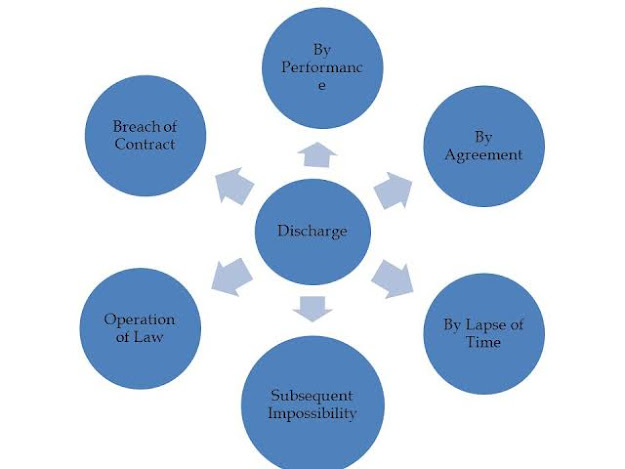DISCHARGE OF CONTRACT
Meaning
Discharge of contract means the termination of contractual relation between the parties to a contract. A contract terminates when rights and obligations of the parties come to an end.
Modes Of Discharge Of Contract
 |
A contract may be discharged in any of the following modes:
• By Performance
• By Agreement
• By Subsequent impossibility
• By Lapse of time
• By Operation of law
• By Breach of contract
1. Discharge by Performance
When the parties to a contract perform their promises, the contract is discharged. If one of the parties performs the promise, he alone is discharged. The performance may be actual performance or offer to perform.
a. Actual performance
When both parties to a contract fulfill the obligations according to the terms and conditions of a contract, it is called actual performance of the contract and the contract comes to an end. [Sec. 37]
Example
A agrees to sell his watch to B for Rs. 400. A deliver the watch to B and B makes the payment. This is actual performance of contract
b. Offer to perform
When the promisor offers to perform the promise but the promisee does not accept the performance, it is called offer to perform or tender. An offer to perform is not an actual performance but it is equivalent to actual performance [Sec.38]
Example
A agrees to sell a book to B for Rs. 500. A offers to deliver the book but B does not accept it. This is offer of performance.
2. Discharge by Agreement
A contract is discharged by agreement in the following ways
a. Novation
Novation of contract means replacement of an existing contract by a new contract. The new contract may be formed between the same parties or new parties. Thus, an old contract is discharged and a new contract comes into existence. [Sec. 62].
Examples
a. A owned to B and B owned to C. All parties agreed that A would pay to C. It is novation
b. A owes B, Rs. 10,000. A mortgaged his estate to B for the debt of Rs. 10,000. It is a new contract that terminates the old one.
b. Alteration
Alteration of a contract means q change in one or more terms of the contract with mutual consent of parties. The alteration in contract discharges the original contract and creates a new contract. In case of alteration, the parties remain the same and only the terms of contract are changed. [Sec.62]
Example
A agrees to supply salt to B on 1st Feb, 2018. Later, A and B agrees to change the date of delivery to 1st March 2018. It is alteration of contract.
c. Rescission
The recession means cancellation of a contract by all the parties with mutual consent. A contract may be cancelled by agreement between the parties at any time before its performance. The cancellation of agreement release the parties from their obligations. [Sec. 62]
Example
A promises to deliver goods to B on a certain date. Before the date of performance, A and B agree that the contract will not be performed. The contract is rescinded.
d. Remission
The remission means the acceptance of a lesser consideration than what was mentioned in the contract. Where the promisee remits the whole or some part of promise, or extends the time of performance of contracts, the contract is discharged. [Sec. 63]
Example
A owes B, Rs. 5,000. B agrees to accept Rs. 2,000 in full satisfaction of his claim. The whole debt is discharged.
e. Waiver
The term wavier means the intentional giving up of a right which a person is entitled to under a contract. When a party waives his rights under the contract, the other party is released from his obligations.
Example
A promises to supply rice to B. Later, B releases A from fulfilling the contract. The contract is terminated by wavier.
3. Discharge by Subsequent Impossibility
When performance of a contract becomes impossible due to subsequent different reasons which are beyond the control of parties, the contract becomes void. It is also called the doctrine of frustration or doctrine of supervening impossibility. The following factors make a contract void. [Sec. 56]
a. Destruction of Subject matter
When the subject matter of a contract, after the formation of contract, is destroyed without the fault of promisor or promisee, the contract is discharged. But if the destruction of subject matter is caused by fault of any party, he is liable for damages.
Examples
a. C lent his hall to T for concerts. The hall was destroyed by fire before the first concert. The contract became void. (Taylor vs. Caldwell)
b. C contracted to sell potatoes to H but failed to supply as the crop was destroyed by a pest. The contract was held to be discharged. (Howell vs. Coupland)
b. Change in circumstances
When some circumstances arise after the formation of a contract and, as a result, the performance of contract becomes impossible, the contract becomes void on the grounds of impossibility of performance.
Examples
a. A contract to hire a room at a hotel to attend a seminar to be held on a particular date. The seminar is postponed. The contract is discharged.
b. H hired a room from K to see the coronation of king. The coronation was cancelled due to the king's illness. K sued for rent. It was held that H need not pay the rent. (Krell vs. Henry)
c. Death or personal Incapacity
Where the performance of a contract depends upon personal skill or qualification or existence of a particular person. The contract is discharged on the illness, incapacity or death of that person.
Examples
a. A and B contract to marry each other. A dies before the time fixed for marriage. The contract becomes void.
b. An artist agreed to sing on particular date but fell ill and could not sing. Held, that the contract as discharged. (Robinson vs. Davison)
d. Change of Law
A lawful contract may becomes unlawful due to change in law. Subsequently, such contract becomes impossible to be performed. A subsequent change in law may make the contract illegal and the contract is discharge
Examples
a. A promise to sell wheat to B. Before delivery, the government banned the sale of wheat by private traders. The contract was discharge.
b. There was a contract for sale of trees in a forest. Later, contract was discharged when the state of Rajasthan forbade the cutting of trees in that forest. (Man Singh vs. Khazan Singh)
e. Declaration of war
A contract entered into before the commencement of war remains suspended during the war. However, such contract may be restored after the war is over, if the nature of the contract so permits
Example:
A contract to carry cargo for B at a foreign port. Later, A's government declares war against the country where port is situated. The contract becomes void.
4. Discharge by lapse of Time
The limitation Act, 1908 states that in case of breach of contract, legal action must be taken within a specified period. If the contract is not performed and no legal action is taken by the promise within the period of limitation, he is debarred from enforcing the contract. The period of limitation to recover debt is 3 year. If 3 years expire and creditors fails to file a suit to recover his amount, the debtor is discharged from his liabilities.
Example
A owed Rs. 5,000 to B. The last date of repayment of the loan expired but B did not sue A until 3 years. B lost the rights to recover
5. Discharge by Operation of Law
A contract terminates by operation of law in the following cases:
a. Insolvency
Where the court declares a person as insolvent, the rights and duties of such person are transferred to the receiver. After the order of the court, such person is discharged from his liabilities.
Example
A promises to sell his car to B for Rs. 2 lac. Before the performance of the contract. A is declared insolvent by court. The contract is discharged.
b. Merger
When a contract creating inferior rights for the party merges into a new contract creating superior rights, the former contract is discharged
Example
Where a part time lecturer is appointed as permanent lecturer, the contract of part time lectureship is discharged by merger.
c. Material Alteration
A material alteration means making an unauthorized change in the material terms of a contract which affects the rights, liabilities and legal position of the parties to a contract. If one party makes any material alternation in the terms of a contract without consent of the other party, the contract in discharged.
Example
A executes a pro-note in favour of B for Rs. 300. B exceeds the amount from Rs. 300 to 3,000 by alteration. A may refuse to pay Rs. 300
6. Discharge by Breach of Contract
The breach of contract means failure of a party to perform his obligations when a party fails to perform the contract, there is breach of contract. It discharges the aggrieved party from performing his obligations. It may be actual breach or anticipatory breach.
a. Actual Breach
Actual breach of contract occurs when a party fails to perform the contract on the date of performance. If a party fails to performs the contract on the date of performance, it is called actual breach of contract on date of performance.
If a party has performed a part of the contract but refuses to perform the remaining part of the contract, it is called an actual breach of contract during course of performance.
Examples
a. B agrees to deliver 5 bags of wheat on 1st March. B does not deliver the wheat on that day. This is an actual breach of contract on date of performance.
b. A agreed to deliver 500 shoes to B. The shoes were to be delivered in installments. When A delivered 200 shoes, B refused to buy more shoes. B committed an actual breach of contract during course of performance.
b. Anticipatory Breach
Anticipatory breach of contract occurs when a party declares his intention not to perform the contract before the due date of performance when a party to the contract communicates to the other party, his intention not to perform the contract before the due date of performance, it is an express breach.
When a party to the contract does an act which makes the performance of contract impossible, it is implied breach.
When a party to the contract does an act which makes the performance of the contract impossible, it is implied breach.
Examples
a. Agrees to supply wheat to B on 1st July. On 15th June, A excuse to B that he will not supply the wheat. This is express breach of contract.
b. A promises to sell his horse to B on 1st June. Before that A sells the same course horse to C. This is implied breach of contract.
Effects of Anticipatory Breach
In anticipatory breach, the promisee gets the following rights:
1. He is released from performance.
2. He may treat the contract as cancelled and sue the other party for damages.
3. He may ignore the conduct of promisor and wait for the time of performance.









0 Comments
If you have any doubt, please let me know!